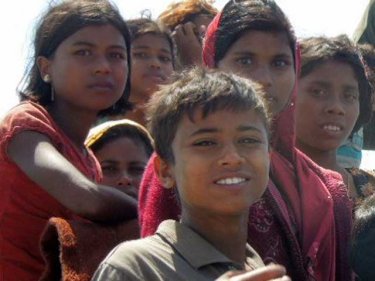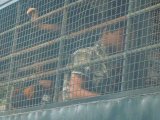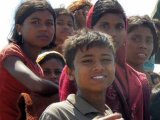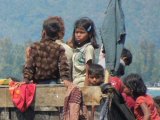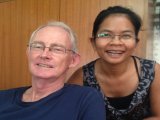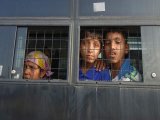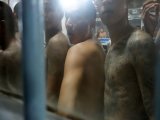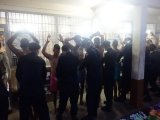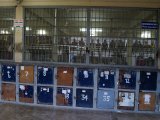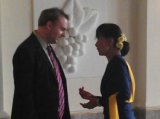Reporters Without Borders condemns the criminal defamation charges brought against Alan Morison, an Australian journalist based in the southwestern province of Phuket who edits the news website Phuketwan, and Chutima Sidasathian, a Thai journalist who works for the site.
The Phuket police charged and fingerprinted Morison and Chutima on 18 December in response to a Royal Thai Navy complaint about a 17 July report on the site mentioning a Reuters claim that the navy took money to turn a blind eye to the smuggling of Rohingya refugees from neighbouring Burma.
"It is intolerable that journalists are being prosecuted for just doing their job by relaying information of general interest that had already been made public," Reporters Without Borders said.
"Bringing charges under the controversial Computers Crimes Act in a defamation case is indicative of the critical state of freedom of information in Thailand and amounts to an attempt to gag the media. We support these journalists, who are facing a possible five-year jail term, and we call for the immediate withdrawal of these proceedings."
When Morison and Chutima appeared before the police on 18 December, they pleaded not guilty to charges of defaming the Royal Thai Navy and violating the Computer Crimes Act, for which they could be sentenced to five years in jail and fine of 100,000 bath (2000 euros). The next hearing is scheduled for tomorrow.
As well as editing Phuketwan, the 65-year-old Morison works for various international media such as CNN and the South China Morning Post.
He told Reporters Without Borders: "With the whole future of Thailand as a democracy up in the air, it is not a good time for the military to be suing media outlets using oppressive criminal defamation laws. The Computer Crimes Act is even more unsavoury."
Morison added: "When a respected arm of the military chooses to wield bad laws rather than making a telephone call or issuing a media release, you have to wonder where Thailand is being taken."
Burma's Rohingya people are regarded by the United Nations as one of the most persecuted minorities in the world and the exodus of Rohingya refugees is a high profile issue in Thailand.
Thailand is ranked 135th out of 179 countries in the 2013 Reporters Without Borders press freedom index.
Reporters Without Borders
Freedom of expression and of information will always be the world's most important freedom. If journalists were not free to report the facts, denounce abuses and alert the public, how would we resist the problem of children-soldiers, defend women's rights, or preserve our environment? In some countries, torturers stop their atrocious deeds as soon as they are mentioned in the media. In others, corrupt politicians abandon their illegal habits when investigative journalists publish compromising details about their activities. Still elsewhere, massacres are prevented when the international media focuses its attention and cameras on events.
Freedom of information is the foundation of any democracy. Yet almost half of the world's population is still denied it.
The Phuket police charged and fingerprinted Morison and Chutima on 18 December in response to a Royal Thai Navy complaint about a 17 July report on the site mentioning a Reuters claim that the navy took money to turn a blind eye to the smuggling of Rohingya refugees from neighbouring Burma.
"It is intolerable that journalists are being prosecuted for just doing their job by relaying information of general interest that had already been made public," Reporters Without Borders said.
"Bringing charges under the controversial Computers Crimes Act in a defamation case is indicative of the critical state of freedom of information in Thailand and amounts to an attempt to gag the media. We support these journalists, who are facing a possible five-year jail term, and we call for the immediate withdrawal of these proceedings."
When Morison and Chutima appeared before the police on 18 December, they pleaded not guilty to charges of defaming the Royal Thai Navy and violating the Computer Crimes Act, for which they could be sentenced to five years in jail and fine of 100,000 bath (2000 euros). The next hearing is scheduled for tomorrow.
As well as editing Phuketwan, the 65-year-old Morison works for various international media such as CNN and the South China Morning Post.
He told Reporters Without Borders: "With the whole future of Thailand as a democracy up in the air, it is not a good time for the military to be suing media outlets using oppressive criminal defamation laws. The Computer Crimes Act is even more unsavoury."
Morison added: "When a respected arm of the military chooses to wield bad laws rather than making a telephone call or issuing a media release, you have to wonder where Thailand is being taken."
Burma's Rohingya people are regarded by the United Nations as one of the most persecuted minorities in the world and the exodus of Rohingya refugees is a high profile issue in Thailand.
Thailand is ranked 135th out of 179 countries in the 2013 Reporters Without Borders press freedom index.
Reporters Without Borders
Freedom of expression and of information will always be the world's most important freedom. If journalists were not free to report the facts, denounce abuses and alert the public, how would we resist the problem of children-soldiers, defend women's rights, or preserve our environment? In some countries, torturers stop their atrocious deeds as soon as they are mentioned in the media. In others, corrupt politicians abandon their illegal habits when investigative journalists publish compromising details about their activities. Still elsewhere, massacres are prevented when the international media focuses its attention and cameras on events.
Freedom of information is the foundation of any democracy. Yet almost half of the world's population is still denied it.

